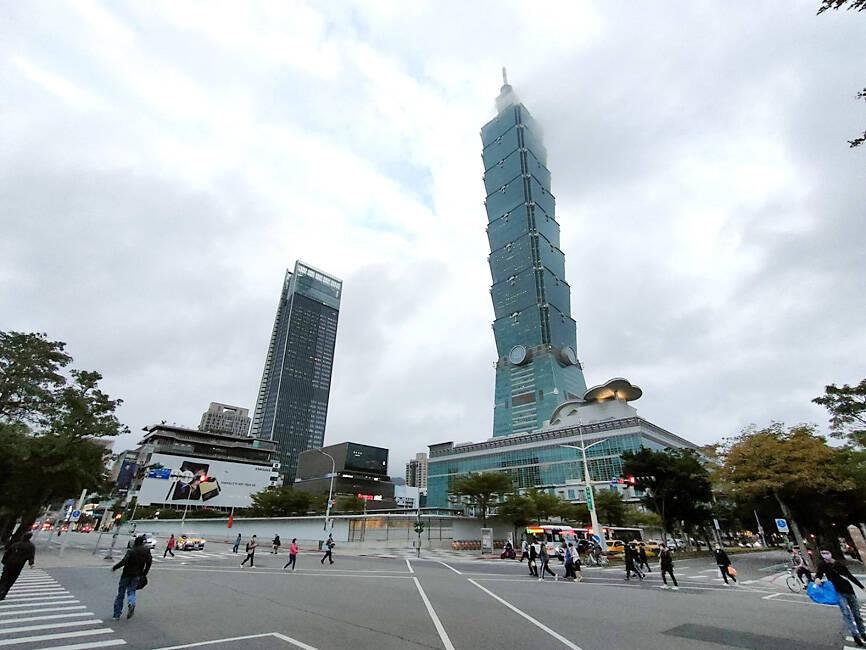Taiwan has been ranked as the ninth most digitally competitive country this year, moving up two places from last year, among the 64 countries evaluated by the Swiss-based International Institute for Management Development (IMD), according to a report that was released yesterday.
The IMD World Digital Competitiveness Ranking, which used 54 indicators based on three major factors, showed Taiwan in third place in technology, a jump from sixth last year.
For the other two major factors — knowledge and future readiness — Taiwan was ranked 18th and seventh respectively, with the latter representing a rise from eighth place last year.

Photo: Hsu Yi-ping, Taipei Times
Meanwhile, among the 54 indicators, Taiwan took the top spot in five areas, namely total research and development (R&D) personnel per capita, information technology (IT) and media stock market capitalization, mobile broadband subscribers, agility of companies, and use of big data and analytics.
Other noteworthy standings included the indicators of higher education achievement and total expenditure on R&D — two areas in which Taiwan rose in the rankings to third place in the IMD report.
Taiwan’s leading performances in fields such as IT, media stock market capitalization and mobile broadband can be attributed to the government’s efforts to provide subsidies and other incentives to telecommunications companies to construct and expand the 5G network infrastructure, the Ministry of Digital Affairs said.
Regarding the future readiness factor, the ministry said that the category primarily measures the degree of digital transformation in a country, and Taiwan ranked first in two indicators — agility of companies and the use of big data and analytics.
This is because Taiwan’s economic model, which features small and medium-sized enterprises, has the advantages of flexibility and quick response to market changes, the ministry said.
The top rankings reflect the government’s effective efforts to subsidize small, medium and micro enterprises to promote digital transformation and technological innovations such as cloud computing and data analysis, the ministry said.
The assessments in the IMD’s latest report would serve as a reference for the government’s policymaking, as part of the efforts to develop Taiwan’s digital economy, promote information security and expand public-private collaboration to achieve digital transformation, the ministry said.

The US government has signed defense cooperation agreements with Japan and the Philippines to boost the deterrence capabilities of countries in the first island chain, a report by the National Security Bureau (NSB) showed. The main countries on the first island chain include the two nations and Taiwan. The bureau is to present the report at a meeting of the legislature’s Foreign Affairs and National Defense Committee tomorrow. The US military has deployed Typhon missile systems to Japan’s Yamaguchi Prefecture and Zambales province in the Philippines during their joint military exercises. It has also installed NMESIS anti-ship systems in Japan’s Okinawa

‘WIN-WIN’: The Philippines, and central and eastern European countries are important potential drone cooperation partners, Minister of Foreign Affairs Lin Chia-lung said Minister of Foreign Affairs Lin Chia-lung (林佳龍) in an interview published yesterday confirmed that there are joint ventures between Taiwan and Poland in the drone industry. Lin made the remark in an exclusive interview with the Chinese-language Liberty Times (the Taipei Times’ sister paper). The government-backed Taiwan Excellence Drone International Business Opportunities Alliance and the Polish Chamber of Unmanned Systems on Wednesday last week signed a memorandum of understanding in Poland to develop a “non-China” supply chain for drones and work together on key technologies. Asked if Taiwan prioritized Poland among central and eastern European countries in drone collaboration, Lin

NO CONFIDENCE MOTION? The premier said that being toppled by the legislature for defending the Constitution would be a democratic badge of honor for him Premier Cho Jung-tai (卓榮泰) yesterday announced that the Cabinet would not countersign the amendments to the local revenue-sharing law passed by the Legislative Yuan last month. Cho said the decision not to countersign the amendments to the Act Governing the Allocation of Government Revenues and Expenditures (財政收支劃分法) was made in accordance with the Constitution. “The decision aims to safeguard our Constitution,” he said. The Constitution stipulates the president shall, in accordance with law, promulgate laws and issue mandates with the countersignature of the head of the Executive Yuan, or with the countersignatures of both the head of the Executive Yuan and ministers or

CABINET APPROVAL: People seeking assisted reproduction must be assessed to determine whether they would be adequate parents, the planned changes say Proposed amendments to the Assisted Reproduction Act (人工生殖法) advanced yesterday by the Executive Yuan would grant married lesbian couples and single women access to legal assisted reproductive services. The proposed revisions are “based on the fundamental principle of respecting women’s reproductive autonomy,” Cabinet spokesperson Michelle Lee (李慧芝) quoted Vice Premier Cheng Li-chiun (鄭麗君), who presided over a Cabinet meeting earlier yesterday, as saying at the briefing. The draft amendment would be submitted to the legislature for review. The Ministry of Health and Welfare, which proposed the amendments, said that experts on children’s rights, gender equality, law and medicine attended cross-disciplinary meetings, adding that